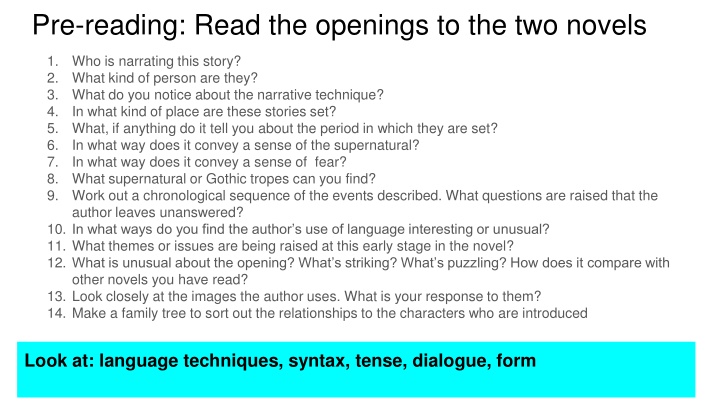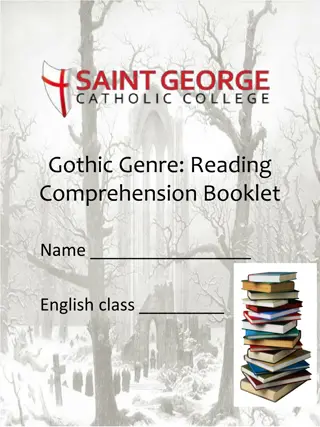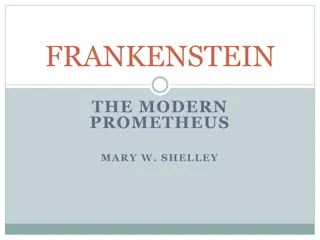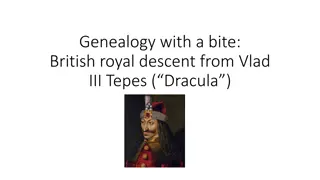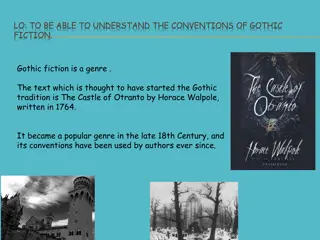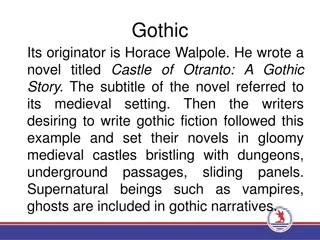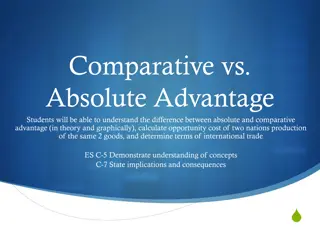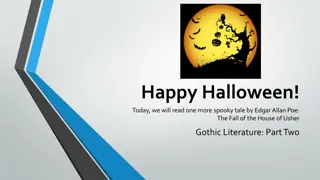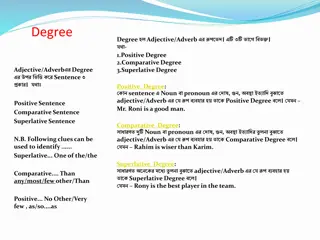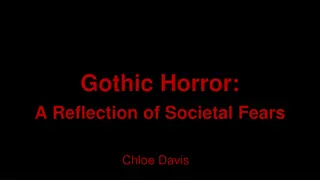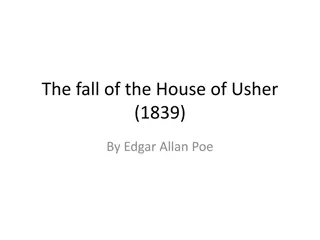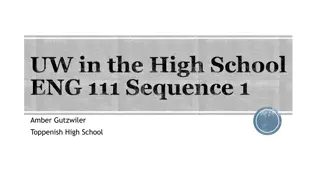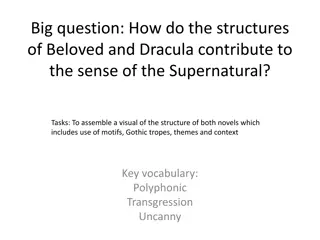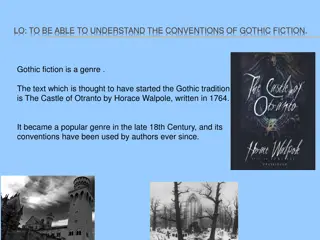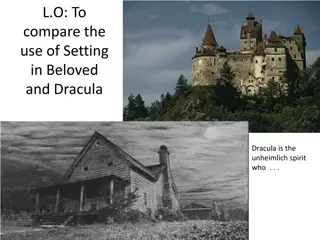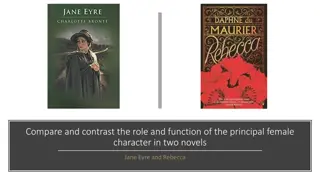Comparative Analysis of Gothic Novels: Dracula and Unnamed Story
The provided texts delve into the openings of two different Gothic novels, exploring narrators, settings, supernatural elements, and narrative techniques. Readers are encouraged to analyze the themes, characters, and use of language by the authors in the early stages of the stories. Epigraphs from the novels and detailed descriptions prompt reflection on the impact of these literary devices.
Download Presentation

Please find below an Image/Link to download the presentation.
The content on the website is provided AS IS for your information and personal use only. It may not be sold, licensed, or shared on other websites without obtaining consent from the author.If you encounter any issues during the download, it is possible that the publisher has removed the file from their server.
You are allowed to download the files provided on this website for personal or commercial use, subject to the condition that they are used lawfully. All files are the property of their respective owners.
The content on the website is provided AS IS for your information and personal use only. It may not be sold, licensed, or shared on other websites without obtaining consent from the author.
E N D
Presentation Transcript
Pre-reading: Read the openings to the two novels 1. 2. 3. 4. 5. 6. 7. 8. 9. Who is narrating this story? What kind of person are they? What do you notice about the narrative technique? In what kind of place are these stories set? What, if anything do it tell you about the period in which they are set? In what way does it convey a sense of the supernatural? In what way does it convey a sense of fear? What supernatural or Gothic tropes can you find? Work out a chronological sequence of the events described. What questions are raised that the author leaves unanswered? 10. In what ways do you find the author s use of language interesting or unusual? 11. What themes or issues are being raised at this early stage in the novel? 12. What is unusual about the opening? What s striking? What s puzzling? How does it compare with other novels you have read? 13. Look closely at the images the author uses. What is your response to them? 14. Make a family tree to sort out the relationships to the characters who are introduced Look at: language techniques, syntax, tense, dialogue, form
Reading the Opening Chapters Compare the ways the two writers use narrative voice Compare the ways the two writers set up their themes and characters in the opening chapter
What questions do you have about these two texts? Write them down on a piece of sugar paper and stick them up on the wall. Leave space underneath for them to be answered later.
Dracula How these papers have been placed in sequence will be made manifest in the reading of them. All needless matters have been eliminated, so that a history almost at variance with the possibilities of later-day belief may stand forth as simple fact. There is throughout no statement of past things wherein memory may err, for all the records chosen are exactly contemporary, given from the standpoints and within the range of knowledge of those who made them. Beloved Sixty million and more I will call them my people, which were not my people; and her beloved, which was not beloved. ROMANS 9: 25 Epigraphs: an inscription on a building, statue, or coin/ a short quotation or saying at the beginning of a book or chapter, intended to suggest its theme.
Do these epigraphs change the way that you read the novels? In what way?
3 May. Bistritz.--Left Munich at 8:35 P.M., on 1st May, arriving at Vienna early next morning; should have arrived at 6:46, but train was an hour late. Buda-Pesth seems a wonderful place, from the glimpse which I got of it from the train and the little I could walk through the streets. I feared to go very far from the station, as we had arrived late and would start as near the correct time as possible. The impression I had was that we were leaving the West and entering the East; the most western of splendid bridges over the Danube, which is here of noble width and depth, took us among the traditions of Turkish rule. We left in pretty good time, and came after nightfall to Klausenburg. Here I stopped for the night at the Hotel Royale. I had for dinner, or rather supper, a chicken done up some way with red pepper, which was very good but thirsty. (Mem. get recipe for Mina.) I asked the waiter, and he said it was called "paprika hendl," and that, as it was a national dish, I should be able to get it anywhere along the Carpathians. I found my smattering of German very useful here, indeed, I don't know how I should be able to get on without it. Having had some time at my disposal when in London, I had visited the British Museum, and made search among the books and maps in the library regarding Transylvania; it had struck me that some foreknowledge of the country could hardly fail to have some importance in dealing with a nobleman of that country. I find that the district he named is in the extreme east of the country, just on the borders of three states, Transylvania, Moldavia, and Bukovina, in the midst of the Carpathian mountains; one of the wildest and least known portions of Europe.
124 WAS SPITEFUL. Full of a baby's venom. The women in the house knew it and so did the children. For years each put up with the spite in his own way, but by 1873 Sethe and her daughter Denver were its only victims. The grandmother, Baby Suggs, was dead, and the sons, Howard and Buglar, had run away by the time they were thirteen years old--as soon as merely looking in a mirror shattered it (that was the signal for Buglar); as soon as two tiny hand prints appeared in the cake (that was it for Howard). Neither boy waited to see more; another kettleful of chickpeas smoking in a heap on the floor; soda crackers crumbled and strewn in a line next to the door sill. Nor did they wait for one of the relief periods: the weeks, months even, when nothing was disturbed. No. Each one fled at once--the moment the house committed what was for him the one insult not to be borne or witnessed a second time. Within two months, in the dead of winter, leaving their grandmother, Baby Suggs; Sethe, their mother; and their little sister, Denver, all by themselves in the gray and white house on Bluestone Road. It didn't have a number then, because Cincinnati didn't stretch that far. In fact, Ohio had been calling itself a state only seventy years when first one brother and then the next stuffed quilt packing into his hat, snatched up his shoes, and crept away from the lively spite the house felt for them.
Narrative voice The choice of the point(s) of view from which the story is told . . . fundamentally affects the way the reader will respond, emotionally and morally to the fictional character and their actions. David Lodge. The Art of Fiction A narrative is always told by someone. The narrator is not necessarily the same as the author of the book which contains the narrative: the author is a real person; the narrator is simply the voice to whom the words of the narrative are attributed; a single novel may contain several narrators . . . we might think of the narrator as a point of view embodied in a character, who can, if wished, represent the author; although sometimes the voice of a narrative or its point of view are not clearly expressed as a character.
Different types of narrative voice C H F L A K G D I J E B What kind of narrative voices do Dracula and Beloved have? Why? Third person omniscient narrator Self-conscious narrator Focaliser Free indirect style Intrusive narrator Stream of consciousness Inadequate/naive narrator Multiple voices Second person address Unreliable narrator First person narrative Interior monologue
Using the terms and definitions you have been given, identify what choices of narrative voice have been made in the Three Little Pigs. What are the different effects achieved through this choice of narrative voice? 10 min
Dracula : p9 When I got on the coach . . . to we set off on our journey. P14: As they sank to sick feeling of suspense . P16 All at once . . to moonlit sky . Beloved: Pg 6 That s all you let yourself remember . . to could not forget her memory for that . Pg 10 He looked at her then to pulsing red light . Pg 15 Denver sat down on the bottom step to they were not a twosome any more Questions to focus your exploration How would you describe the narrative voice? Does it shift within the extract? Whose point of view is being given? Which character is the focaliser, if any? What words or phrases helped you decide? What is the effect of the narrative voice? As well as thinking about the choice of narrative voice (for instance, why might an author choose to tell the story in 3rd person stream of consciousness rather than 1st person?), its effect and any shifts in the voice (for instance, why might an author move from 3rd person omniscient to free indirect style?) you will also need to consider the way the author creates a particular impression of the character through this voice. Is it, for example, low key or exuberant, detached or intimate, gossipy or intellectual. To explore this, you will need to analyse: Lexis (word choice) Sentence structure (long and rambling or short and clipped, for example) Key phrases The balance between description and narration
Why does Stoker use a naive narrator to tell the story in the first four chapters of Dracula? In Beloved, Morrison slides between an omniscient narrator and free indirect style. Why does she do this? Use one quote from the critical extracts in your answer
In pairs, annotate and discuss the section you have been given. Look at language, structure, form and write down relevant quotes Beloved 1. 2. 3. 4. 5. Who is telling the story? From whose point of view is it told? Where is it set? Who is in the story? What do we learn about them? How is the identity of the ghost revealed? In what way is it effective? Underline all references to the past. Who is remembering? What are they remembering? What is Morrison saying about slavery? What do you notice about the structure of the narrative (see above) What do you notice about the way the characters speak? What do you notice about the end of Chapter 1? What Gothic/supernatural tropes do you notice? 6. 7. 8. 9. Dracula 1. Who is telling the story? How is it told? Why has Stoker chosen to tell the story through Jonathan Harker s point of view? Who is in the story? What do we learn about them? Where is it set? How is the identity of the ghost revealed? In what way is it effective? What is Harker s attitude to the lands he travels through and their people? How does he create suspense? What do you think the Borgo Pass represents? What do you notice about the end of Chapter 1? What Gothic tropes do you notice? 2. 3. 4. 5. 6. 7. 8. 9.
